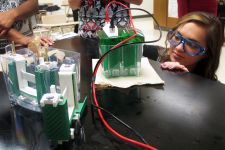Local Researcher Leads East Side Students in Advanced Breast Cancer Lab

UTHSC student Larry Larsen works with a student at Highlands High School.
Credit: Highlands High School Fine Arts DepartmentHigh school students on the east side of San Antonio got the chance to contribute to cancer research on October 8 through a program that brings university scientists into the classroom to share their research and passion for science.
Aaron Jacobs, a doctoral candidate in the laboratory of Willard Clark, Ph.D., associate professor of biochemistry and molecular biology, led an advanced workshop on breast cancer research at Highlands High School. The event was the capstone to a larger unit within a year-long course led by Jacobs through the Superior Educators GK-12 Program at UTHSC, which places research students from the School of Medicine into local high school, middle and grade school classrooms throughout the city.
“This program is hugely beneficial for the high school students,” Jacobs said. “They got the chance to conduct a truly novel experiment in breast cancer research, examining a specific research question that no one else in the world has ever done.”
Over the past five years, the School of Medicine has contributed several teaching fellows to the Superior Educators GK-12 Program at UTHSC. Last year, Jacobs helped teach biology at Brackenridge High School. This year, he got the opportunity to delve more deeply into the subject due to the Highlands’ participation in Project Lead the Way, a not-for-profit organization that provides resources to support rigorous and innovative science, technology, engineering and math education in schools across the country. Highlands was one of the first schools in the United States to pilot the program, which now has its headquarters in San Antonio.
“These students are likely to be the next generation of researchers, physicians and nurses – I challenge them at a very high level,” said Jacobs, whose research on the growth mechanics of breast cancer cells informs his classroom instruction as its happening.
 The experiment on Nov. 8 closed out a unit on breast cancer research that also included lectures, exams and other interactive research units. Jacobs led the students in examining a novel mechanistic pathway through which tumor suppressor proteins influence cell cytokinesis using high-tech equipment made available through Dr. Clark’s lab and Project Lead the Way. The goal was to discover answers to why cancer cells are able to change modify cell signaling and grow uncontrollably.
The experiment on Nov. 8 closed out a unit on breast cancer research that also included lectures, exams and other interactive research units. Jacobs led the students in examining a novel mechanistic pathway through which tumor suppressor proteins influence cell cytokinesis using high-tech equipment made available through Dr. Clark’s lab and Project Lead the Way. The goal was to discover answers to why cancer cells are able to change modify cell signaling and grow uncontrollably.
“I’m helping them take their work from a basic high school level to something closer to the college level – to understand what’s going to be expected of them as they enter the 0orld of higher education,” Jacobs said. “What’s great about this program is it provides graduate students an opportunity to teach, but not like a traditional teaching assistant. I wanted something more challenging, and, at the same time, something that would help the community.”
The challenge will continue until the end of the academic year as Jacobs continues to design advanced science curriculum in collaboration with R.J. McAdams, the teac;her responsible for three of the four advanced biomedical sciences courses at Highlands.
“Our students can really relate to this material because we actually talk about cancer biology in class -- we do whole modules on cancer,” McAdams said. “Project Lead the Way attracts some pretty high-level kids who are interested in careers in medicine.”
Each participant in the Superior Educators GK-12 Program at UTHSC devotes about 15 hours a week to the project, including 10 hours of classroom instruction. Jacobs had already taught units on breast cancer research, cancer biology and pathology prior to the lab project.
“Being able to do this in a classroom environment really brings home the impact of science in a powerful way,” Jacobs said. “Yes, we’re bringing these classes into their classroom, but the students are also doing outreach in the community. What they’re doing is transforming the culture in places where science is not a priority into a culture where science is real -- it’s real and it’s happening in their own school.”
